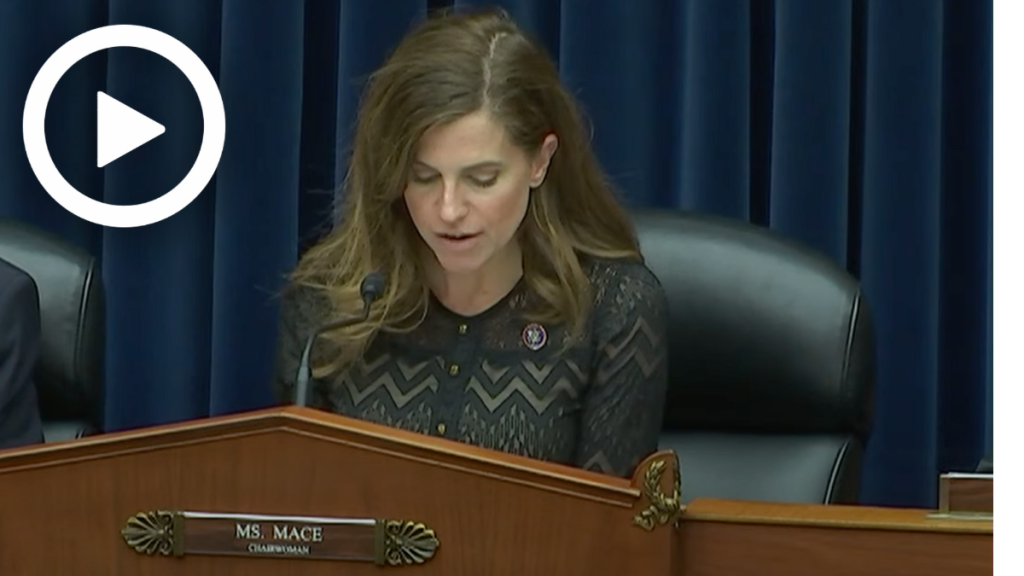Mace Opens Hearing on White House Policy on AI
WASHINGTON—Subcommittee on Cybersecurity, Information Technology, and Government Innovation Chairwoman Nancy Mace (R-S.C.) today delivered opening remarks at a hearing titled “White House Policy on AI.” In her opening statement, Subcommittee Chairwoman Mace detailed how the Biden Administration’s executive order on artificial intelligence and subsequent OMB draft guidance task federal agencies with mitigating against the dangers of specific, high-risk AI use cases. She emphasized the importance of spurring the recruitment and retention of AI experts in both the public and private sectors to ensure the safe and reliable use of cutting-edge AI tools.
Below are Subcommittee Chairwoman Mace’s remarks as prepared for delivery.
Good afternoon and welcome to this hearing of the Subcommittee on Cybersecurity, Information Technology and Government Innovation.
Since the release of ChatGPT just over a year ago, it has become clear AI could soon disrupt nearly every facet of our economy and society—from health care to warfare.
And that’s good news. AI is a triumph of American innovation. It is likely to boost business productivity, raise our standard of living, and lead to life-saving and life-extending medical advances.
But like any powerful tool, AI could be used to inflict great harm when it is used carelessly—or by malicious actors.
That’s why we’ve explored the dark side of AI in this Subcommittee: the risks that AI-fueled cyberattacks pose to our national security and critical infrastructure; the threats to data privacy; the ways child-sexual abuse material can proliferate online via deepfake technology; and the risk of personal harm to individuals from unchecked algorithmic bias.
These risks and others—including the use of AI to weaponize biotechnology—are addressed in the broad-reaching Executive Order on AI that President Biden signed on October 30th.
Two days later, OMB followed-on with draft guidance specifically governing federal agency use of AI. A brief comment period on that guidance ended yesterday.
In the E.O., the President invokes extraordinary emergency powers under the Defense Production Act to require companies to notify the Government about the development of powerful new AI systems, and to share safety testing results.
But for the most part, both the E.O. and the OMB guidance task federal agencies with mitigating against the dangers of specific, high-risk AI use cases—as opposed to regulating the technology itself. That’s a critical distinction.
The AI genie is out of the bottle. It can’t be put back inside. Suppressing core AI innovation here in the U.S. won’t stop China from advancing the technology on its own. And if we fall behind China in the AI race…all other risks will seem tame by comparison.
That’s why I support measures in these documents that seek to spur the recruitment and retention of AI experts—in both the private and public sector. Here in the federal government, we need employees who can responsibly partner with the private sector to procure AI systems that make our government smarter, smaller and more effective.
I look forward to hearing views from industry witnesses today concerning how the OMB AI guidance is likely to impact federal agency’s use of AI, and the ability of businesses to work with the government to provide cutting edge AI tools that are safe and reliable.
But no one can yet judge the impact of the E.O. or the guidance. For the most part, they are just kick-starting a process.
The E.O. tasks federal agencies with a massive laundry list of roughly 150 action items to take over the next year and beyond. Dozens of regulations and guidance documents will be issued. Every major agency and many minor ones are enlisted in the effort.
So, we in Congress will be watching closely as this process unfolds.
But I’m skeptical federal agencies will keep to the timetable of action laid out in these documents. The track record here is not good.
After all, the draft OMB guidance on government use of AI we’re discussing today was due by law from this Administration more than two years ago.
With that, I will now yield to Ranking Member Connolly for his opening statement.
